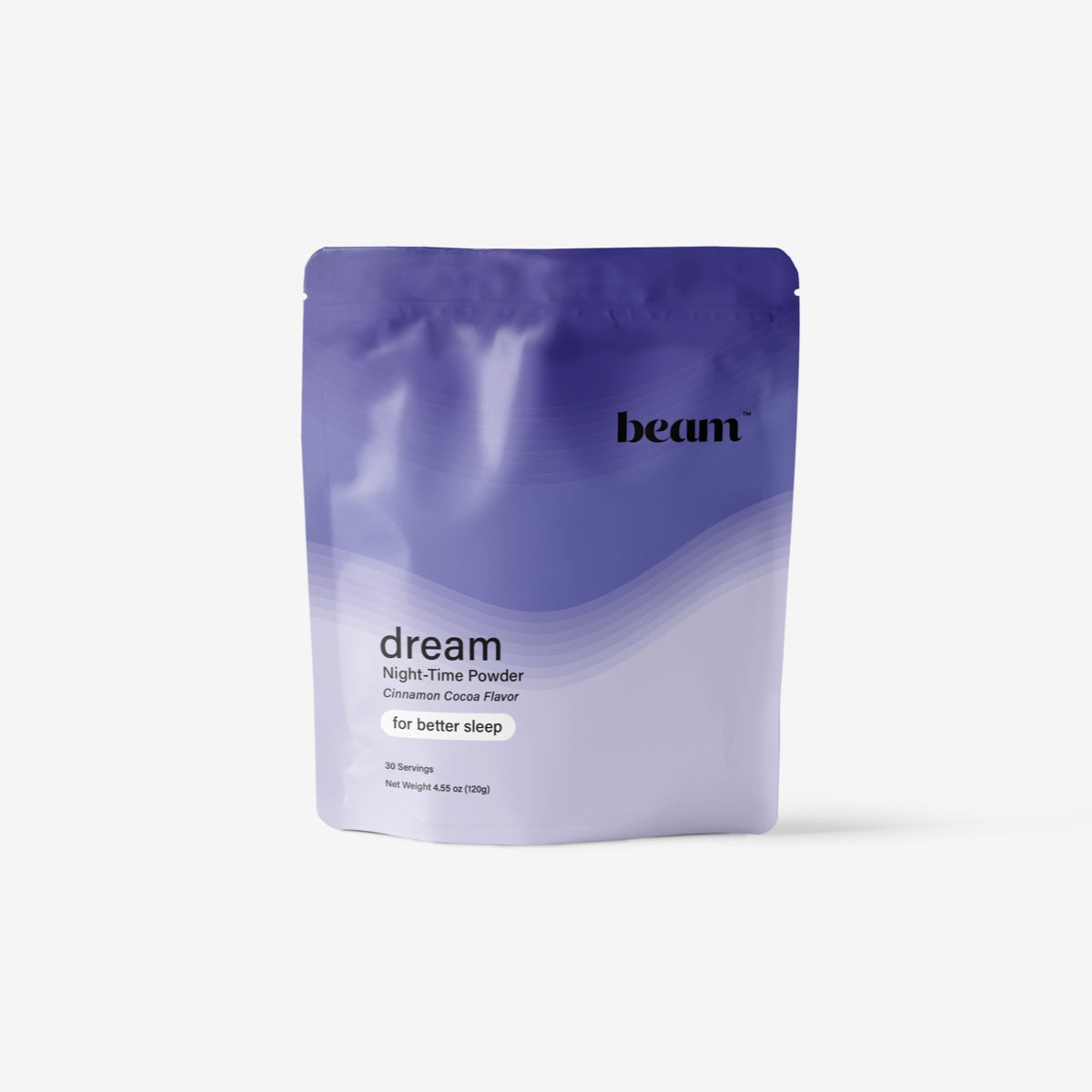by Matt Lombardi
As co-founder of Beam, one thing I’m constantly talking to people about is sleep. People who have trouble sleeping are acutely aware of how quality sleep impacts their lives because they’ve identified sleep as an issue, sought out our sleep supplements, and experienced the benefits in their waking hours.
But I also speak to people who are having issues in other areas of their health and wellness who aren’t aware that sleep might be a factor—in everything from fitness to productivity to their state of mind.
Personally, I’ve come to understand sleep as the cornerstone of wellness. It truly affects everything. The start of a new year is a great time to talk about sleep because it tends to be a time when people are looking to make a big change. No matter what your goals are this year, better sleep can likely make an enormous impact. In this article, I hope to shed some light on later-stage sleep in particular, and why it’s actually a crucial hack for your New Year’s goals.
Deep Sleep and REM Sleep
Before we go any further, let’s define “later-stage sleep.” Deep sleep and REM (Rapid Eye Movement) sleep are the latter two of the four stages of sleep that make up a full sleep cycle–and they’re especially important for both physical and mental health. While all stages of sleep are vital, deep sleep and REM sleep play particularly crucial roles in regulating the body, supporting brain function, and improving your state of mind.
Your New Year’s Resolution: A healthier body
This is the top resolution, and it’s a fairly common one from year to year. Simply put, deep sleep is where the body recovers and repairs itself. During deep sleep, the body releases Human Growth Hormone, which helps to repair and regenerate tissue, build muscle, and strengthen bones. REM sleep also plays a role in physical recovery, as it helps to regulate the body's metabolism and immune system function.
Trying to lose weight? Sleep plays a crucial role in regulating the hormones leptin and ghrelin, which are involved in appetite and satiety. Leptin is a hormone produced by fat cells that signals to the brain when the body has had enough to eat, while ghrelin is a hormone produced by the stomach that stimulates appetite. According to Sleep Foundation, "dysregulation of ghrelin and leptin may lead to increased appetite and diminished feelings of fullness in people who are sleep deprived.” This can lead to overeating.
Your New Year’s Resolution: Be more productive
You want to crush it at work. You want to be able to focus for longer periods of time. You want to be able to do more, faster—and you want to enjoy doing it.
Deep sleep and REM sleep are important for maintaining cognitive function, including memory, concentration, and problem-solving skills. According to a study done at the University of Pennsylvania, “Recent research has led scientists to hypothesize that Stage 3...may be especially important for the improvement of memory retention and recall.” REM sleep, the stage of sleep when the brain is most active, is thought to be important for learning, memory consolidation, and creativity. According to James B. Maas, Ph.D. and the American Psychological Association, “During REM sleep, the brain busily replenishes neurotransmitters that organize neural networks essential for remembering, learning, performance and problem solving.”
TL;DR: The later stages of sleep are essential for helping you find that ever-elusive “flow state” during the day.
Your New Year’s Resolution: Be more present
This one is especially important to me because our relationships are one of the biggest factors in our mental and physical health. Without our relationships, our lives lack meaning—and without the ability to be present, our relationships fall by the wayside. With everyone I pack into my day, it’s important to me that I have brain space for my friends, family, and loved ones.
Adequate sleep, including deep sleep and REM sleep, is essential for maintaining good mental health. Period. According to the journal AIMS Neuroscience, "there is evidence that sleep plays a key role in regulating emotion." Lack of sleep can even contribute to feelings of anxiety and depression, while getting enough sleep can help to improve mood and emotional well-being. Sleep can help you to feel more rested, more energetic, and more alert, and it can help you to be more present and engaged in your relationships and daily activities.
How to get better sleep in 3 weeks
The American Academy of Sleep Medicine advises, "adults should sleep 7 or more hours per night on a regular basis to promote optimal health." For many of us, that can feel impossible. Here are the tools I suggest to people who want to transform their sleep in as little as 3 weeks. They may seem drastic, but if you want to get serious about your sleep, health, and goals, it’s necessary to put a little work in.
Week 1:
Set the scene
To the best of your ability, make your bedroom a true resting place. Remove excess clutter, like piles of paperwork or mail. Get new, more comfortable bedsheets and comforters. If you’re using part of your bedroom as an office, move your workspace to the living room or kitchen. Find a way to cover up all electronic light—even the small lights from digital clocks, heaters, or air conditioners can make a difference. Keep your bedroom cool: studies show that a cooler environment helps the body ease into sleep. If you have noisy neighbors, consider investing in a white noise machine, or pop in your headphones and use this White Noise podcast to help lull you to sleep. Most importantly: make your bed a no-screen zone. If you need to finish up some work emails or want to watch TV, do it on the couch.
Get real
Determine your ideal bedtime and wake-up time. Andrew Huberman, Professor of Neurobiology at Stanford and host of The Huberman Lab podcast, stresses the importance of consistency:

Be honest with yourself: consider how much sleep you need to feel rested and alert, while also getting real about what time your body actually tends to fall asleep, and how much time you need to wind down. Aim for a consistent bedtime and wake-up time each day. My ideals: I try to fall asleep by 11pm (which means being in bed by 10:30 with my Dream Powder) and wake up by 7am with no snoozing.
Week 2:
Gather your tools
In Week 2, after you’ve set yourself up for success, try incorporating relaxation techniques into your pre-sleep routine. This could include deep breathing, progressive muscle relaxation, or visualization. One of my favorite sleep hacks: lay down with your hips up against the wall and your legs straight up the wall. This allows blood to flow in the opposite direction, grounding your nervous system for deep, restful sleep. While you should try to avoid vigorous exercise close to bedtime (as it can energize the body and make it more difficult to fall asleep), regular daytime exercise can also help to improve sleep quality.
My most important tool is, of course, Dream Powder, our best selling hot cocoa for sleep. Dream Powder is clinically shown to improve sleep in 93% of people. It’s formulated with 5 powerful natural sleep ingredients (Nano Hemp, Reishi, Magnesium, L-Theanine, and Melatonin) to help your body get the most out of all four stages of sleep.* If you’re not into cocoa, we have several delicious flavors like White Chocolate Peppermint, Sea Salt Caramel, and Pumpkin Spice to satisfy your taste buds.
One last thing: caffeine and alcohol are deterrents to sleep. Try to keep alcohol intake to a minimum and stop your caffeine intake by 12pm.
Week 3:
Measure your progress
Everyone’s different, and different techniques might work better for different people. In Week 3, after you’ve taken the time to get acquainted with some of the above techniques, start keeping a log of what works and what doesn’t. Maybe you need to stop drinking caffeine at 10am instead of noon. Maybe you do well with yoga right before bed instead of cardio at 3pm. Maybe you need Extra Strength Dream Powder instead of Regular Strength. Track your eating, drinking, exercise, and night-time habits and compare them against how well you sleep that night.
Remember: building a new sleep routine takes time and consistency. Don't get discouraged if you have setbacks along the way. With a little dedication and persistence, you can build a new sleep routine that works for you.
Trying to reach your goals without proper sleep is like driving a car with the emergency brake on: you’re not going to get very far. With time, you’ll find that proper rest will help you achieve your resolutions much more quickly and sustainably. The sky’s the limit!
If you have a moment, I’d love to hear about how these techniques worked for you. DM us @beam on Instagram, or DM me directly @mattlombardi24. I love hearing from you.
Get the sleep you need in 2023:












